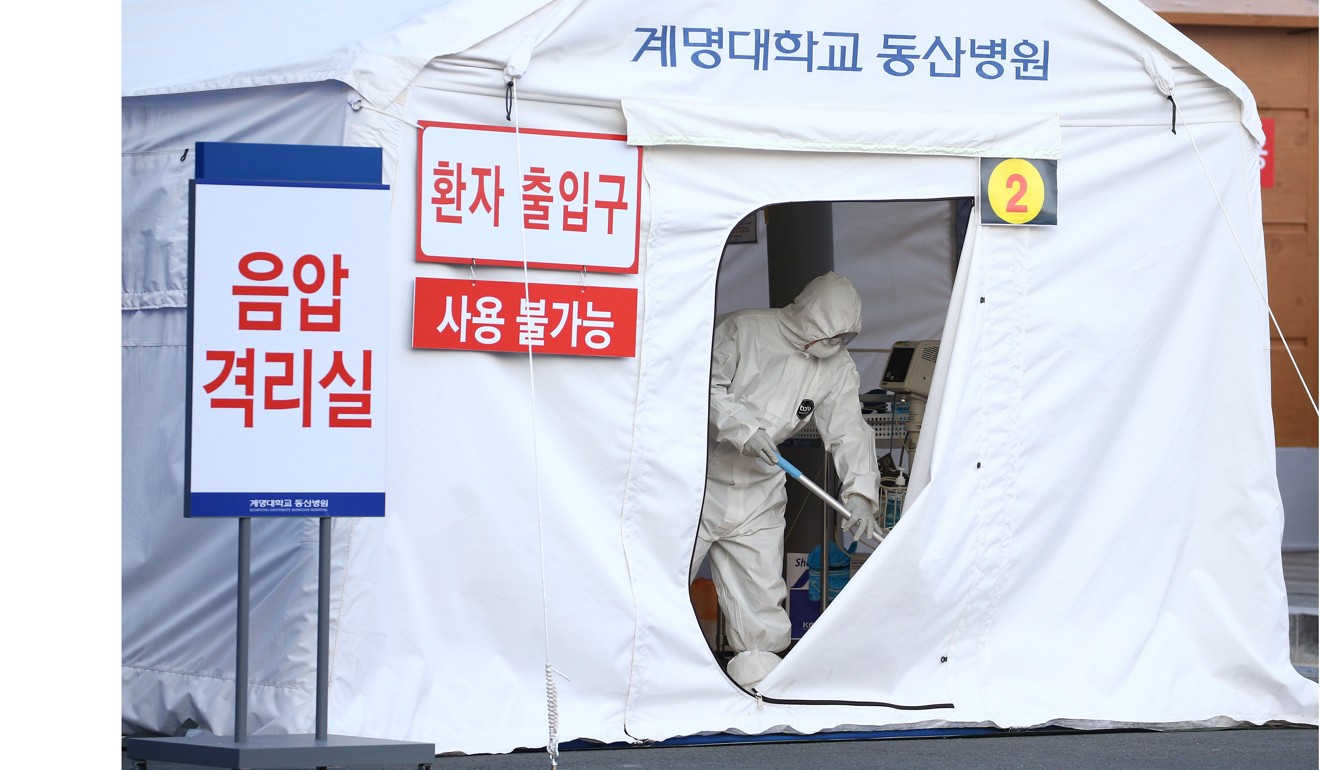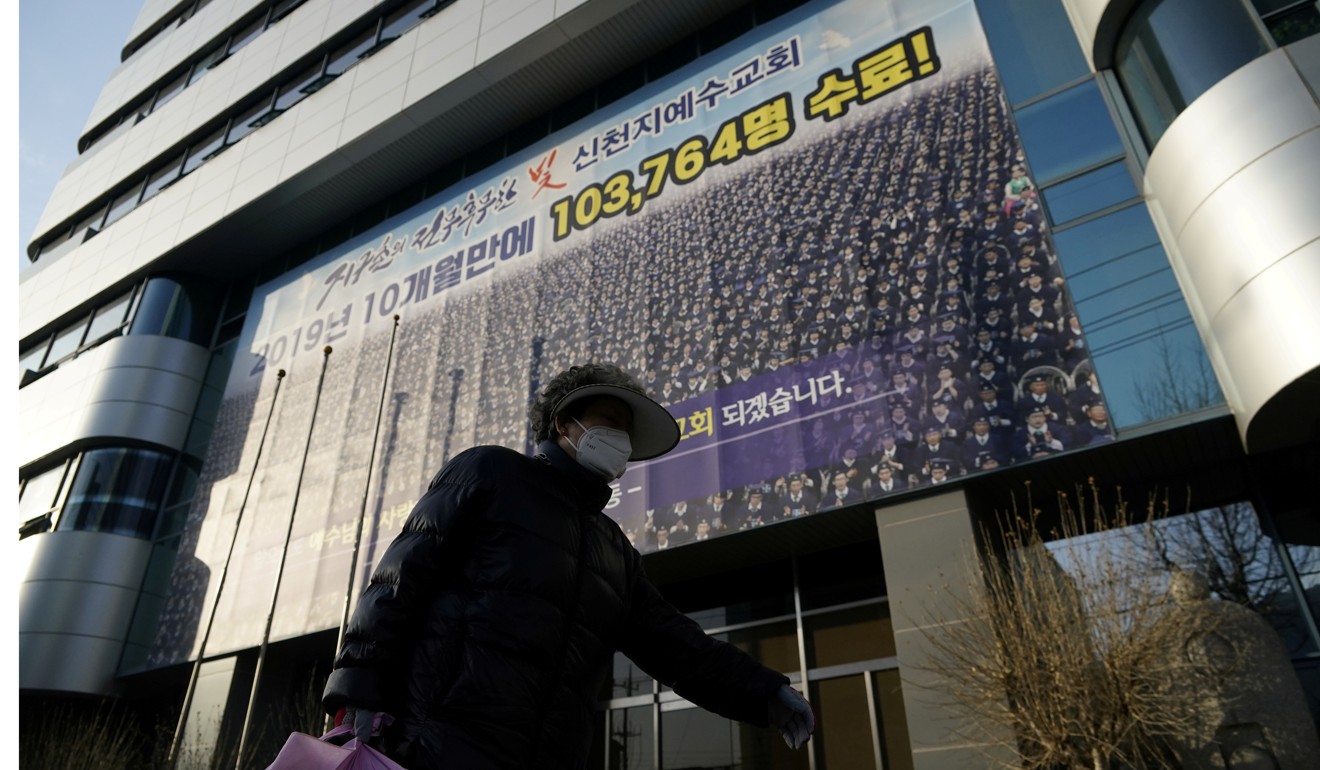
Coronavirus: South Korea sees eight-fold jump in cases to 433, most linked to Daegu church
- Of the new cases, 200 are linked to the Shincheonji Church of Jesus in Daegu
- Samsung halts operations at its Gumi plant after a worker was confirmed to be infected with the virus
There’s concern that the death toll, currently at three, could grow. Virus patients with signs of pneumonia or other serious conditions at the Cheongdo hospital were transferred to other facilities, 17 of them in critical condition, Vice Health Minister Kim Gang-lip told reporters.
He said that the outbreak had entered a serious new phase, but still expressed cautious optimism that it can be contained to the region surrounding Daegu, where the first case was reported on Tuesday.

South Korean Prime Minister Chung Se-kyun started a government meeting on the health emergency on Friday by saying: “We have entered an emergency phase. Our efforts until now had been focused on blocking the illness from entering the country. But we will now shift the focus on preventing the illness from spreading further in local communities.”
Chung promised support to ease a shortage in hospital beds, medical personnel and equipment in Daegu. By Saturday morning, the city of 2.5 million and nearby areas counted 352 cases, including the two fatalities in the Cheongdo hospital.
The central government has declared the area as a “special management zone” and is channelling support to ease a shortage in hospital beds, medical personnel and equipment.
“Although we are beginning to see some more cases nationwide, infections are still sporadic outside the special management zone of Daegu and North Gyeongsang Province,” Kim said during a briefing. He called for maintaining strong border controls to prevent infections from China and elsewhere from entering South Korea.
Three people have died in the country in the current outbreak; a 41-year-old man was found dead in his home on Saturday and the health authorities confirmed he was tested positive, a woman in her fifties who was moved from the Cheongdo hospital to Busan for treatment and a 63-year-old man, who also died at the same hospital.
Usually bustling downtown streets of Daegu were nearly deserted as people wearing face masks lined up at clinics seeking testing. Crowds formed in supermarkets where shelves of ramen and curry were nearly bare. Eight hundred area schools, due to start a new academic year on March 2, delayed their openings by a week.
“Panic is taking hold,” said Daegu resident Huh Mi-yeon. “People are scared of any situation where they would run into another person.”
“The stores are empty. There's nothing left on the shelves but bean paste and red pepper,” said Hee Sook-baek, a 38-year-old yoga instructor from Daegu.
“My parents live in an area with confirmed cases, so they're not leaving the apartment. Our other family in the area is delivering their food and helping them relieve the boredom.”
Coronavirus: South Korea in crisis mode as Daegu cases surge
Nationwide, the numbers told of a ballooning problem. There were 20 new cases reported Wednesday, 53 on Thursday and 100 on Friday.
Around 230 of those have been directly linked to a single house of worship, a Daegu branch of the Shincheonji Church of Jesus, where a woman in her 60s attended two services before testing positive for the virus.
Officials are also investigating a possible link between church-goers and the spike in infections at the Cheongdo hospital, where more than 110 people have been infected so far, mostly patients at a mental illness ward.
Health officials were screening some 9,300 church followers, and said that 1,261 of them have exhibited cough and other symptoms.
Among them, four had travelled abroad in recent months, including one to China, although that trip came in early January and was away from Hubei.

All 74 sites operated by the Shincheonji Church have been closed and worshippers have been told to instead watch services online for a sect whose leader claims to be an angel of Christ, but who is dismissed by many outsiders as a cult leader. Its teachings revolve largely around the Book of Revelation, a chapter of the New Testament known mostly for its apocalyptic foreshadowing.
Health and city officials say the woman who first tested positive had contact with some 1,160 people, both at the church, a restaurant and a hospital where she was treated for injuries from a car accident.
But officials say it’s unlikely that the woman set off the chain of infections, and that she was probably just the first person to be detected in an area where the virus was circulating in the population.
Coronavirus ‘super spreader’ at South Korean church sparks infection fears
Meanwhile, Samsung Electronics said on Saturday that one coronavirus case had been confirmed at its mobile device factory complex in the southeastern city of Gumi, causing a shutdown of its entire facility.
Samsung said it plans to close the complex until the morning of February 24. The floor where the infected employee worked will be shut down until the morning of February 25.
Anxiety is also palpable in other parts of the country. In capital Seoul, the fear of the virus led many to avoid shops and restaurants and instead eat at home and order necessities online. Buses and undergrounds were full of mask-clad commuters.
Seoul City banned rallies downtown but hundreds went ahead with an anti-government protest at Gwanghwamun boulevard on Saturday.
Mayor Park Won-soon said those disobeying the ban could face a maximum fine of 3 million won (US$2,500). Some protesters jeered at Park after he briefly appeared at the rally and pleaded with them to go home. The gathering was closely monitored by police officers and there were no immediate reports of major clashes or injuries.
The first three cases in the country’s 600,000-member military also sprang up on separate bases on Friday, bringing added concern. A sailor on Jeju Island and an army officer in North Chungcheong province both tested positive. Both had made recent visits to Daegu, officials said. A third infection was reported in an air force officer who is based in Daegu but who had recently travelled to military headquarters in central South Korea, the defence ministry said, prompting the quarantine of 80 soldiers there.
A US Army garrison in Daegu restricted access and imposed self-quarantine for American troops.
Additional reporting by Bloomberg, Reuters and Josh Doyle


